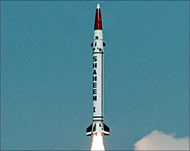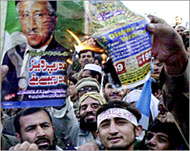North Korea denies nuclear deals
North Korea has denied it had received nuclear technology from Pakistan and accused the United States of mounting a smear campaign to get the upper hand ahead of six-party talks.

The Stalinist state said that the charges were a “sheer lie” despite a confession by Pakistan’s leading nuclear scientist, who admitted last week he had passed on nuclear secrets to North Korea, Iran and Libya.
North Korea’s foreign ministry said the admission by Abd Al-Qadir Khan was part of the US scheme to take the high ground ahead of talks on 25 February to resolve the 16-month-old nuclear crisis.
“The US trite smear campaign would only reveal its deplorable position and will convince no one,” the ministry said in a statement.
Washington argues that the Beijing talks must focus on North Korea’s covert uranium-based programme as well as on its well-documented plutonium-producing enterprise.
North Korea says the uranium programme exists only in the imagination of the United States.
“The United States is now hyping the story about the ‘transfer of nuclear technology’ to the DPRK (North Korea) by a Pakistani scientist in a bid to make the DPRK’s ‘enriched uranium programme’ sound plausible,” said the statement carried by the official Korean Central News Agency.
“This is so sheer (a) lie that the DPRK does not bat an eyelid even a bit.”
Suspicion and evidence
Washington has long suspected North Korea of selling missile technology to Pakistan in return for parts and know-how on uranium enrichment.
 |
|
Washington suspects North Korea |
In October 2002 Washington confronted Pyongyang with evidence, triggering the current nuclear crisis.
North Korea, which Washington said admitted the charge at the time, has since steadfastly denied it.
The foreign ministry statement said Khan’s confession was part of a US plot to add credibility to the enriched uranium charges ahead of six-party talks.
The two Koreas, China, Japan, Russia and the United States will gather for the new round of talks and at least one nation, China, continues to view with scepticism the US allegations on uranium.
South Korea, which says it has no independent proof of the charges, has recently referred to the US evidence as convincing.
Talks
The Pakistani scientist’s confession came just a day after North Korea said it would attend the new round of six-party talks brokered by China in an effort to end the nuclear crisis.
 |
|
Pakistani protestors supported |
At the talks, North Korea would likely offer to freeze its plutonium-producing nuclear complex at Yongbyon, 90 km north of Pyongyang in return for economic aid and other concessions from Washington.
But it has refused to acknowledge any uranium enrichment activities. The United States wants verifiable pledges from North Korea to eliminate its alleged uranium enrichment program, plutonium reprocessing and existing atomic weapons.
Washington believes North Korea already has one or two crude nuclear bombs made from plutonium diverted from its nuclear complex in Yongbyon before a 1994 nuclear freeze took effect.
Pact
The 1994 pact unravelled after Washington confronted North Korea in October 2002 concerning the suspected uranium enrichment project.
North Korea has since boasted that it has increased its nuclear deterrent and reprocessed enough spent nuclear fuel rods to produce several more atomic bombs.
Analysts and officials here fear that little progress can be expected at the second round of six-party talks unless North Korea is willing to address its suspected uranium enrichment programme.